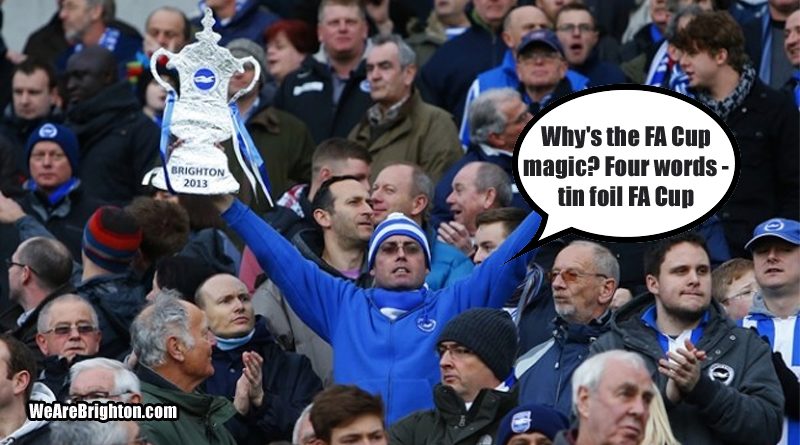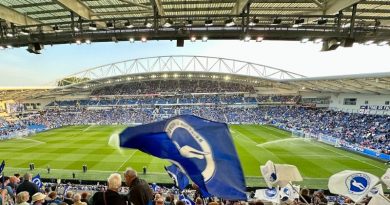7 reasons why the FA Cup is still magic to Brighton fans
Apparently, the FA Cup is in serial decline. We’re told that clubs view it as a distraction and so field reserve sides while supporters are turning their backs as games are played out to a background of half-empty stadiums and general apathy.
There are calls to modify the 148-year old competition, with some even quietly petitioning for it to be dropped all together. According to some, it doesn’t work anymore and nobody really cares about it anyway.
While that might be the case in certain corners of England, it certainly isn’t in the City of Brighton and Hove. For the second FA Cup game running to be held at the Amex, the Albion have nearly sold out their stadium to it’s 30,666 capacity.
The opponents haven’t exactly been glamorous – League Two Coventry City last time, West Bromwich Albion this Saturday. But no matter who is in town, the people of Sussex can’t get enough of the world’s greatest knockout competition.
It hasn’t always been this way – Milton Keynes Dons’ visit in 2017 drew a crowd of just 11,091 while Reading in 2014 fared slightly better with 20,696 attending.
So, why have Brighton fans fallen back in love with the FA Cup? Here are seven reasons why the FA Cup is still magic to Seagulls supporters.
The FA Cup offers a rare shot at glory
With the Premier League’s top six sides so far ahead of everyone else, it means that the best that a club like the Albion can aspire to is finishing seventh. Realistically, a successful season is avoiding relegation.
Where’s the glory in finishing somewhere between seventh and 17th in the table? The simple answer is there isn’t any. There isn’t much fun in your only purpose being to avoid the bottom three or celebrating doing so either. The FA Cup offers a shot at silverware and a chance for glory that doesn’t otherwise exist for 14 of the 20 Premier League clubs. Nobody remembers where Wigan Athletic finished in the table during their eight seasons in the top flight, but everyone remembers them lifting the cup in 2013.
It could be a realistic goal as well. Liverpool are already out of the competition and one of Arsenal or Manchester United won’t be in round five. That potentially leaves just three of the big six left in the competition, opening the way for a less-fancied club to possibly go all the way. Why not Brighton?
It is no longer a distraction
When we were fighting for promotion out of the Championship, reaching the Premier League was the be-all and end-all. That’s why nobody minded too much about the embarrassment of getting knocked out by non-league Lincoln City two seasons ago as we could do without distractions from the ultimate goal which was a top-two finish.
While Premier League survival is important, it’s nowhere near as vital as reaching the top flight in the first place. We’re getting the £110m broadcast income, we’re going to places like Stamford Bridge and Anfield, we’re beating Manchester United and Arsenal at home. Suddenly, the FA Cup seems like a competition you can devote more attention towards.
It’s a route into Europe
With the top six being pretty much unbreakable, it also means that Europe is even further away than Jacob Rees-Mogg would like it to be. Unless you reach the FA Cup final and the opponents are a side in the Champions League, in which case you are awarded the Europa League spot that is reserved for the Wembley winners.
In the last 15 years, clubs such as Portsmouth and Swansea City have qualified for continental competition through a domestic cup and ended up taking on the likes of AC Milan and Valencia. Imagine the Albion hosting an Italian or Spanish giant at the Amex or an away trip to Eastern Europe where it is £1.50 a pint? The FA Cup is a way of making that dream a reality.
Brighton’s second-string aren’t a weakened side anymore
The argument about clubs fielding reserve sides doesn’t really apply to the Albion anymore as Chris Hughton has put together a squad so strong that his second choice 11 is almost as good as his first.
We saw that in the 1-0 Carabao Cup defeat to Southampton back in August, when the Albion boss made 10 changes and still ended up fielding the most expensive line up in the club’s history. At Bournemouth in the last round, Bruno, Yves Bissouma and Anthony Knockaert – all established Premier League performers – were among the “second string” given an opportunity to play.
It’s a far cry from seven years ago when a reserve side to face Wrexham in the third round contained Grant Hall, Ben Sampayo and Romain Vincelot with Anton Rodgers, Yaser Kasim and Toby Agdestein coming off the bench. These days, you buy a ticket knowing you’re going to see proven Premier League performers, not youngsters who disappear into obscurity once their Albion careers are over.
Tickets are cheap
Talking of buying tickets, another reason why the Amex is selling out on a regular basis for the FA Cup is the affordability of going. Profit Paul Barber seems to have got the pricing of it absolutely spot on at £15 an adult across the stadium.
When a lot of supporters are priced out by a home league game costing anything between £45 and £65, the FA Cup provides a great opportunity to watch the Albion play for those who might not otherwise be able to afford it.
There is a day out at Wembley at the end of it
If you discount a league game in a half-empty stadium against opponents who only care about finishing above Arsenal, then the Albion have only ever played at Wembley three times in their history. The last of those came in 1991, a generation ago.
The thought of a sea of blue and white walking down Wembley Way on a sunny May afternoon, the arch welcoming Brighton and Hove Albion to their second ever FA Cup Final and a chance of immortality is an enticing one.
It’s a chance to make a tin foil FA Cup
Who doesn’t love coming home from the pub on a Friday night after seven pints and attempting to make a tinfoil FA Cup for the following day when pissed? It’s the number one reason we’ll be at the Amex for the visit of the Baggies.
Nostalgia
Even 36 years on from the Albion’s only previous appearance in an FA Cup final, 1983 is still fondly talked about. Relegation that season sparked a decline which ended with the club homeless and only avoiding relegation out of the Football League because Hereford United and then Doncaster Rovers were somehow worse than us.
Yet nobody has a bad word to say about that season because of the cup run. Jimmy Melia won just 13 out of his 44 games in charge, yet remains an almost mythical figure for his disco shoes and taking the club to Wembley.
The FA Cup can elevate players and managers to genuine legend status in a way that few competitions can. And that’s why it is still magical.




